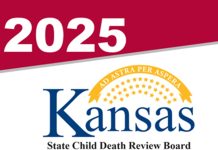A new state audit found that Kansas does not have a comprehensive registry of people who abuse, exploit and neglect children or vulnerable adults because of a fragmented system and a lack of clarity in state law.
Auditors set out to document whether state agencies had complete registries of perpetrators of abuse, neglect and exploitation.
They found that the registries may be incomplete, although the system was so complex it was hard to know for sure whether they were complete or not.
The auditors said in their report that state law isn’t always clear about how state agencies should proceed with allegations of abuse once they’re received.
Different interpretations of state law resulted in different approaches in how agencies investigated, documented or referred cases of abuse, neglect or exploitation, the audit said.
The auditors suggested there were people who should have been added to the registries but weren’t.
“A fragmented system isn’t necessarily bad and may be intentional, but it carries risks,” the audit said.
“For example, if agencies don’t have processes to refer cases to each other and follow up on outcomes, there’s a risk that some perpetrators of (abuse) may not be investigated or identified,” the audit said.
Auditors identified three registries of individual perpetrators of abuse, neglect or exploitation at the Kansas Department of Aging and Development Services and the Department for Children and Families.
The state health department doesn’t keep a registry of abusive perpetrators in medical care facilities because officials say they lack the authority.
Under state law, the state health department is responsible for investigating allegations of abuse, but state law isn’t clear on how it should investigate those cases, the audit said.
For example, state law doesn’t explicitly require the agency to investigate the alleged perpetrator. It only states that it must analyze “whether there is or has been abuse, neglect, or exploitation.”
The agency said it surveys facilities to ensure they comply with statutes and regulations.
However, state health officials said they do not investigate specific incidents of alleged abuse, nor do they determine whether specific individuals were abusive.
The health department said it couldn’t investigate allegations of abuse, neglect or exploitation because of an agreement Kansas has with the federal government.
Officials said the agreement limits their role to regulatory oversight and enforcement.
Officials said investigations of abuse allegations must be handled by the Department for Children and Families, state licensing boards or law enforcement.
However, auditors reviewed 16 of 17 allegations that the Kansas Department of Health and Environmemt referred to DCF for investigation last year.
The auditors found that most referrals were about allegations outside DCF’s jurisdiction and that the state health department took a long time to refer the allegations.
In 11 of the referrals auditors examined, the average time between the alleged incident and the referral to DCF was 249 days, auditors said. The agency took more than a year to refer four of the allegations.
The state health department said that its legal mandate is specific and confined to regulating health and safety standards in licensed facilities.
It said that investigating allegations of adult abuse or neglect, making substantiated findings and maintaining investigative registries “are functions expressly delegated to other agencies and law enforcement.”
The agency said that even if its legal authority were broadened, it would not be able to carry out the responsibilities without more funding.
Meanwhile, KDADS keeps a registry that identifies certified nurse’s aides and unlicensed adult care home staff who perpetrated abuse, neglect or exploitation.
The Kansas Department for Children and Families keeps two registries, one for abuse of vulnerable adults and another for abuse of children.
Auditors told lawmakers that a name is not placed on a registry until after an investigation is completed and someone has a chance to appeal.
The auditors found that state law is vague about the agencies’ responsibilities to investigate individual perpetrators of abuse, leading to differing processes between agencies.
“Generally, allegations of (abuse, neglect and exploitation) should be investigated and documented in a register. However, the agency responsible for this varies under state law,” the auditors reported.
Agencies have interpreted their responsibilities in different ways because it’s not clear whether the agencies must identify the abuser.
The auditors said state law could be interpreted to mean agencies must say whether abuse
happened but not who did it.
Or it could be interpreted to mean agencies should both say whether abuse happened and identify the perpetrator.
Officials from KDADS officials said they determine whether specific individuals caused abuse based on their licensure, according to the audit.
For example, KDADS will investigate individuals with nurse aide certifications and unlicensed staff, but it won’t investigate licensed staff such as doctors and nurses who don’t also have nurse aide certification because they lack authority.
Administrators at the Department for Children and Families said that they determine whether specific individuals abused vulnerable adults, the audit reported.
They also determine whether family members abused children. By contrast, DCF refers allegations of abuse or neglect of children by third parties to law enforcement.
If law enforcement accepts a referral, DCF doesn’t investigate it further, the audit said.
“It’s not clear whether this should be happening,” the audit said. “State law charges both DCF and law enforcement with investigating abuse or neglect of children.”
The audit also found that state law also is unclear on whether or how agencies should document individuals who have been substantiated of committing abuse.
They said it was not clear whether the registries are meant to be lists of substantiated
individual perpetrators of abuse.
They said state law defines neither “register” nor “registry,” and as a result of that and other state laws, agencies have interpreted their responsibilities in different ways.
KDADS keeps a public registry for certified nurse aides and unlicensed staff who commit abuse in adult care homes, but not for other positions, the audit said.
DCF keeps registries of individual perpetrators of abuse against vulnerable adults
and children to meet other state laws.
Under state law, DCF is responsible for investigating allegations of abuse of vulnerable adults.
DCF also investigates allegations of abuse in state psychiatric hospitals under a 2013 agreement it has with KDADS and the state health department.
State law requires DCF to take allegations of abuse at state psychiatric hospitals, but it doesn’t explicitly require DCF to investigate those allegations.
Finally, DCF and law enforcement are responsible for investigating allegations of abuse or neglect of children, the audit said.
Auditors said they didn’t identify any state laws that explicitly require DCF to keep registries of perpetrators of abuse against adults or children.
However, other state laws suggest DCF should maintain these registries to help with background checks.














